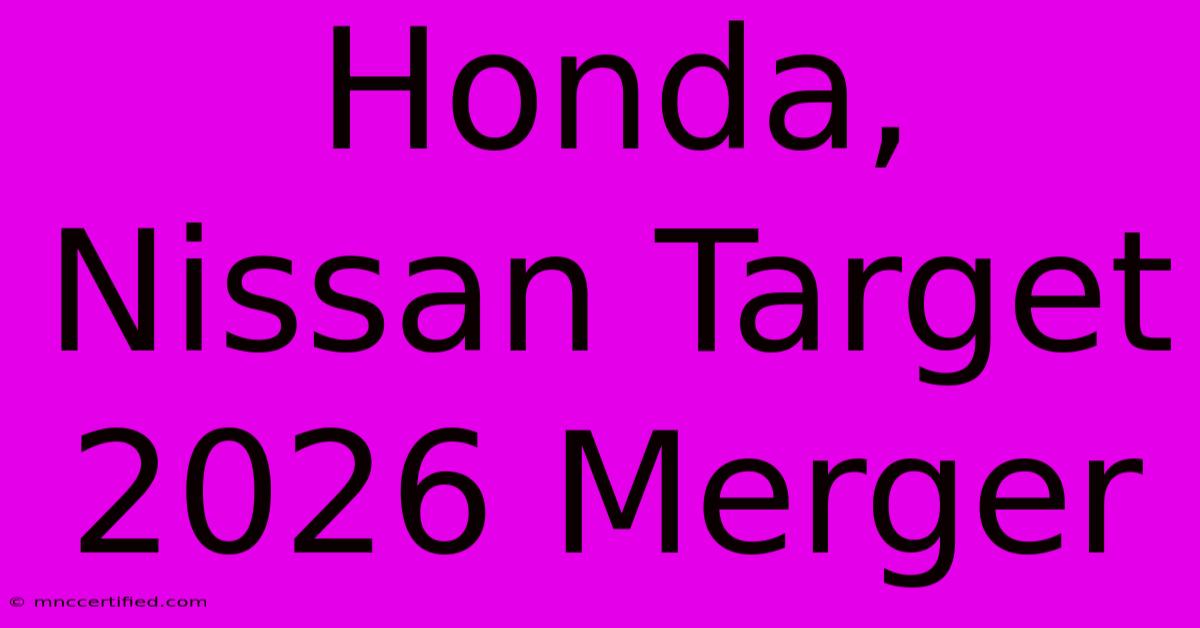Honda, Nissan Target 2026 Merger

Table of Contents
Honda and Nissan Target 2026 Merger: A Deep Dive into the Potential Automotive Giant
The automotive industry is bracing for a potential seismic shift. Rumors of a merger between Honda and Nissan, two of Japan's leading automakers, have intensified, with a potential deal targeted for 2026. This article delves deep into the potential implications of this mega-merger, examining the benefits, challenges, and overall impact on the global automotive landscape.
Why a Honda-Nissan Merger Makes Sense (Strategically)
The potential synergy between Honda and Nissan is undeniable. Both companies possess significant strengths that, when combined, could create a formidable competitor capable of challenging industry leaders like Toyota and Volkswagen.
Shared Resources and Economies of Scale:
- R&D Costs: Merging research and development efforts would drastically reduce costs. This allows for greater investment in crucial areas like electric vehicle (EV) technology and autonomous driving systems. Honda's renowned engine technology and Nissan's expertise in electric vehicle manufacturing create a compelling blend.
- Manufacturing & Supply Chain: Combining manufacturing facilities and streamlining supply chains could lead to significant cost savings and enhanced efficiency. This is particularly vital in the face of ongoing global supply chain disruptions.
- Marketing & Distribution: A combined entity could leverage a broader network for marketing and distribution, reaching a larger customer base and increasing market share.
Technological Synergies:
- Electric Vehicles (EVs): Honda’s advanced hybrid technology coupled with Nissan’s pioneering work in EVs, like the Leaf, could accelerate the development and production of competitive, next-generation electric vehicles. This is crucial for meeting growing global demand and stricter emission regulations.
- Autonomous Driving: Combining expertise in autonomous driving technologies could expedite the development of safer and more advanced self-driving cars.
- Software & Connectivity: The merger would enable the creation of a unified software platform, improving connected car features and enhancing the overall customer experience.
Potential Challenges and Obstacles
Despite the potential upsides, a Honda-Nissan merger isn't without its hurdles:
Cultural Differences:
Integrating two distinct corporate cultures could prove challenging. Overcoming differing management styles, work ethics, and decision-making processes will be crucial for a successful merger.
Regulatory Hurdles:
Antitrust regulations in various countries will need to be carefully navigated. Authorities may scrutinize the merger to ensure it doesn't lead to reduced competition and higher prices for consumers.
Brand Identity:
Maintaining the distinct identities of both Honda and Nissan brands will be crucial. A successful merger requires careful consideration of brand equity and consumer perception. A poorly managed integration could alienate loyal customers of either brand.
The Impact on the Global Automotive Landscape
A successful Honda-Nissan merger would have a profound impact on the global automotive industry:
- Increased Competition: The newly formed entity would become a major global player, intensifying competition with existing giants like Toyota and Volkswagen.
- Innovation Acceleration: Combined resources would likely accelerate innovation in electric vehicles, autonomous driving, and other key technologies.
- Market Consolidation: The merger could trigger further consolidation within the automotive industry, with other companies potentially seeking strategic partnerships or mergers to stay competitive.
Conclusion: A Risky Yet Rewarding Gamble?
The potential merger between Honda and Nissan presents a high-stakes gamble. While the potential benefits in terms of economies of scale, technological advancements, and increased market share are significant, the challenges related to cultural integration, regulatory hurdles, and brand management are considerable. The success of such a merger hinges on meticulous planning, effective execution, and a commitment to navigating the complexities of integrating two powerful automotive brands. Only time will tell if this ambitious endeavor bears fruit. The year 2026 will be a pivotal year to watch in the automotive world.

Thank you for visiting our website wich cover about Honda, Nissan Target 2026 Merger. We hope the information provided has been useful to you. Feel free to contact us if you have any questions or need further assistance. See you next time and dont miss to bookmark.
Featured Posts
-
High Surf Damages Santa Cruz Wharf
Dec 24, 2024
-
Tatum Less Celtics Fall Short In Orlando
Dec 24, 2024
-
Norad Santa Tracker Northeast Louisiana
Dec 24, 2024
-
Red Sox Buehler Finalize 21 M Contract
Dec 24, 2024
-
Festivus Traditions Explained
Dec 24, 2024